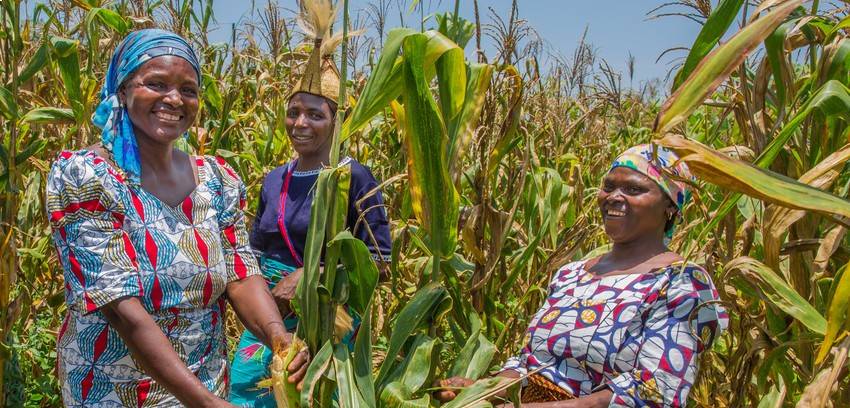 Vocational training and education for women in Nigeria
Vocational training and education for women in Nigeria
Women in Nigeria: Caught between poverty, exclusion and violence
Against all odds, Saratu from Borno State in Nigeria did everything she could to take control of her life and create a positive future for herself and her family. She was forced to leave her old life behind when the Islamist group Boko Haram was on the rise and forcibly displaced civilians. Saratu fled with her family to Bauchi State, west of Borno. She was relieved to find safety for herself and her children. There she joined the Women for Women International programme, which changed her life forever: After three months, Saratu was able to open a business selling bean cakes and earn a secure income with the help of her monthly allowance. Shortly after, Saratu also joined a local savings group with other women from her community. "We save money, give each other loans for our businesses and support each other in difficult times." Saratu gained a new perspective on her rights as a woman in society. The programme gave her hope and self-confidence: "Now that I can save money for the future of my family, I feel incredibly strong."
Necessity
Women in Nigeria are severely affected by discrimination, poverty and violence and often depend on their partners.
Activity
12-month vocational training for disadvantaged and marginalised women in Nigeria so that they can lead a self-determined life.
Countable effort
Number of women in Nigeria who are marginalised and affected by conflict who are able to live more self-determined lives as a result of the one-year training.
Result
Compared to the previous year, it is expected that the women will earn and save more money and have more say in the household as a result of the 12-month training.
Systemic effect
Affected women improve or gain opportunities to earn an income and become more independent. Their state of health improves. They gain access to education. Gender inequality is addressed.
Background
Although Nigeria is Africa’s largest economy, about 52 million women are affected by poverty and live on less than 1.90 US dollars a day (BMZ, 2021, Ifeanyi et al., 2019). Nigeria’s women face many pressures: Their access to education and to reliable information about their rights and health is limited (UNDP, 2021). Girls are less likely to be allowed to attend school – and thus have fewer opportunities to work and earn their own money later on. Conflicts in the country and male-dominated structures encourage discrimination against women and girls and often lead to violence against them. Forced marriage at an early age (UNICEF, 2021), discrimination against girls and women in education and lack of voice are commonplace (UNDP, 2021). In regions characterised by instability, poverty and conflict, women are often affected by (sexualised) violence – and the presence of extremist groups exacerbates this trend. Women in Nigeria bear the brunt of poverty and violence; they are given little recourse to their rights, which they are often unaware of. However, women are the linchpin of families and communities. Only by promoting women and their potential to bring peace can Nigeria achieve long-term stability.
The good deed
With today's good deed you support Nigerian women on their way out of poverty, isolation and violence. You enable a woman from Nigeria to take 4 hours of a one-year vocational training in order to lead a self-determined life. The women in Nigeria enrol in the programme Helping Women to Help Themselves of Women for Women International. Together with 25 other women, they learn in classes how to earn and save money, improve their health and that of their families. They learn how to make their voices heard - at home and in their community. The participants receive a monthly seed money. They form so-called village savings groups so that mutual financial security can be created. The trainings in health, women's rights and peace, as well as the vocational training, ensure a lasting, verifiable improvement in the living conditions of marginalised, conflict-affected women in northern Nigeria. The project gives the women new self-confidence: They earn their own money, know their rights and participate in household decisions. They send their daughters to school, which benefits entire families and communities.

AboutNigeria
Abuja
Capital
206,139,587
Number of inhabitants
2,097 USD
Gross domestic product per capita per year
161 of 189
Human Development Index
With more than 190 million inhabitants, Nigeria is Africa's largest economy (BMZ, 2021). Around 250 different ethnic groups live in Nigeria (bpb, 2021) and over 500 different languages are spoken (Olagbaju, 2014). This multilingual character reflects the diversity of the country. Nigeria's coastal regions are also among the most biodiverse ecosystems in the world.
About the organization and further information
Association
Women for Women International Deutschland gGmbH
Website
https://womenforwomeninternational.de/

Further information and source
- BMZ, 2021. Nigeria Überblick. Bittere Armut trotz Rohstoffreichtum, Stand: 01.04.2021, Berlin.
- bpb, 2021. Afrika. Gesellschaft, Stand: 25.08.2021, Bonn.
- GIZ GmbH, 2021. Nigeria, Stand: 23.03.2021, Bonn und Eschborn.
- Ifeanyi, O., Anthony, N. & Prisca, I., 2019. Poverty among Women in Nigeria–Psychological and Economic Perspective: A Study Based On South West Nigeria, International Journal of Business and Management, Ontario.
- Olagbaju, O.O., 2014. Multilingual Education in Nigeria: Policy, Practice, Challenges and Solutions, Journal of Education and Practice, Vol. 5, Nr. 6.
- UNDP, 2021. COVID-19: Ending violence against women and girls, Stand: 29.03.2021, New York.
- UNDP, 2021. The Covid-19 Pandemic in Nigeria: Potential impact of lockdown policies on poverty and well-being – Brief 3, Stand: 01.04.2021, New York.
- UNHCR, 2021. Nigeria Emergency, Stand: 25.08.2021, Genf.
- UNICEF, 2021. Situation of women and children in Nigeria, Stand: 25.08.2021, New York.
- WfW International Deutschland, 2021. Unsere Arbeit in Nigeria, Stand: 25.08.2021, Hamburg.




